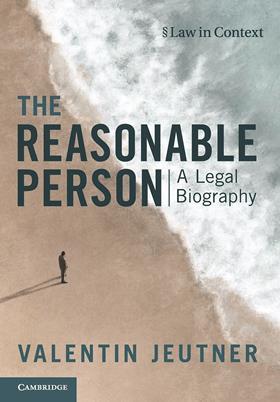The Reasonable Person: A Legal Biography
Valentin Jeutner
£29.99, Cambridge University Press (paperback)
★★★★✩
This volume is a welcome addition to the prestigious Law in Context series of legal textbooks providing ‘new’ perspectives on key legal subjects (since 1970). Falling into the category of an academic treatise on a subject that forms a core concept within multiple areas of legal thought and practice, the core theme of this volume is the reasonable person. That person is the legal subject representing or symbolising a claim to objective reasonableness, and the actions of institutions created by communities, societies, nations, and between nations, expressing claims to reasonable behaviour.
I wanted to review this book because the reasonable person is part of the interior world of my legal thinking, someone I encounter often and have lived with since the first day of my legal education. The reasonable person lived and lives within and across the legal world (ancient, modern and postmodern) as a representative of tests in adjudicating faults and wrongs across the absolute spectrum of behaviours and actions – from the seemingly mundane to the deeply tragic.
I was anxious (unreasonably perhaps) that as a common lawyer (Plumber not Pericles) steeped in English legal tradition (even if my legal education was contextual), I might be confronted with a dense text of legal theory – jurisprudence-legal philosophy steeped in fearfully complex concepts of the psychologies of cognition and language games, of pragmatism and rationality.
I was not so confronted or confounded. However, I admit that I began to flounder at Chapter 6 – The Reasonable Person in the Future – Avatars, Artificial Intelligence, You. I am a reasonable Luddite when Copilot appears, and I resist e-books.

This is a unique, insightful, witty and engaging book written by a legal academic trained in the Anglo-American and continental traditions of legal education. The author has a sharp eye to the future, where my failing eyesight can only peer; akin to an old engineer working on the subterranean water pipes of Birmingham in 1855 (page 31).
The author summarises his work at the start of the Conclusion, tracing the concept through the ancestors of the reasonable person from ancient Egypt (Geru maa: The Silent One), to Greece (Ho spoudaios: The Earnest One), and so to Rome (paterfamilias: the head of the family). We continue into the common law via Scottish sentimentalism, Blyth v Birmingham Waterworks Company and on to the Clapham Omnibus (in my mind’s eye, that passenger had a semblance of a nobody, but I recall that he dwelled in Holloway and lived as Mr Pooter). ‘We followed the reasonable person into the courtrooms of colonial Africa… and onto the battlefield…’ (the latter being a reference to the reasonable war criminal), and then to a reasonable robot.

In conclusion, the author presents the value of the coherent entity: that is, of the concept of the Reasonable Person. This entity is of value to the process of judgment through the provision of an empathetic perspective. It has a certainty in space and time and is no mere legal shapeshifter subjected to the subjective preferences of judges (generic adjudicators). Jeutner argues ‘the reasonable person possesses an essence that can be traced across time and across the different jurisdictions we encountered’. He continues that ‘this essence is the fundamental acceptance that ours is always just one perspective among many and that the best way to understand and accurately assess what others think, do and feel is by empathising with them’.
In Defence of the Reasonable Person means defending the concept against misuse, thus continuing to enable the concept to ‘facilitate the making of tolerant and humane judgments’. This is provided that, the author concludes, ‘the reasonable person is always someone else’, your passenger on the bus.
Christopher Stanley is a freelance human rights litigation consultant































No comments yet